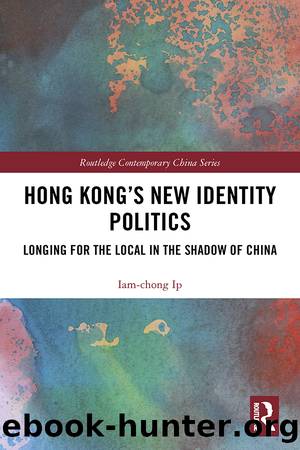Hong Kong's New Identity Politics by Iam-chong Ip

Author:Iam-chong Ip [Ip, Iam-chong]
Language: eng
Format: epub
Tags: Political Science, Political Economy, Social Science, Anthropology, Cultural & Social, Regional Studies
ISBN: 9781000764987
Google: xcXADwAAQBAJ
Publisher: Routledge
Published: 2019-11-28T05:16:38+00:00
6 Neoliberal populism
Ethnicization of right-wing economics
Unfortunately, and contrary to what is currently assumed about the proverbial ivory-tower independence of thinkers, no other human capacity is so vulnerable, and it is in fact far easier to act under conditions of tyranny than it is to think.
(Arendt, 1998[1958]: 324)
In the wake of the Financial Tsunami during 2008â2009, the prevalence and dominance of neoliberal ideology have continued, yet in different forms. Over the past decade, a couple of key governments across the world have implemented the policy of quantitative easing, in which a central bank purchases securities from the market for lowering interest rates and increasing money supply for rescuing financial institutions and enterprises from crisis and even bankruptcy. In the shadow of unprecedented interventions, any full-fledged neoliberal policy program on the basis of the Washington Consensus could hardly be sustained anymore. While the neoliberal orthodoxy declines, neoliberalism as a hegemonic force by no means disappears. A bunch of scholars have noted that neoliberalism is dead but still continues to âwalk the earthâ (Crouch, 2011; Dean, 2012; Peck, 2010b). The observations of the uncanniness of neoliberalism suggest that either assuming the predominance of neoliberalism or jumping to proclaim the death of neoliberalism is too hasty and unfounded. But the questions as of whether, how far, and in what way neoliberalism plunges into âzombieâ condition are worthy of closer examination.
In Hong Kong, the attack on the welfare system, a long-standing issue for neoliberalists, has been dominated by the nativistsâ voices rather than the doctrines of free market economy. Since the late 1990s, there has been heated debate over the Comprehensive Social Security Assistance (CSSA) Scheme, a safety net for people who are not economically self-sufficient and ensures that their basic needs be met. In December 2013, the Final Court of Appeal ruled that the seven-year residency requirement needed for the application for CSSA was unconstitutional. In other words, new immigrants are eligible for CSSA after arriving in Hong Kong for a year. The courtâs ruling sparked a huge uproar on the Internet. Comments such as âHong Kong has fallen,â âHong Kong is finishedâ (c98137208[Philip], 2013) popped up on social media. Critics argued that the ruling has created âthe incentive attracting large numbers of mainland immigrants,â thereby overburdening Hong Kongâs social welfare system (Lu, 2013b). These nativist attacks on the welfare system, following the slurs against people from Mainland China under the label of âlocustâ since 2011, have not been endorsed by market fundamentalists whose voices have been withering in public opinion. For example, the researchers and columnists affiliated with the Lion Rock Institute, an advocacy group committed to âpromote free market ideasâ and to advance âconcrete solutions to keep government small, taxes low and restrictions on business and the individual minimal,â explicitly oppose the trend of âlocust-bashing.â They argue that the welfare system itself nurtures the psychology of making gains without pain in general, rather than specifically for mainlanders. They even advocate further liberalization of immigration policy for attracting more talents and young labor force to the city (Zhu, 2011; Work, 2015).
Download
This site does not store any files on its server. We only index and link to content provided by other sites. Please contact the content providers to delete copyright contents if any and email us, we'll remove relevant links or contents immediately.
International Integration of the Brazilian Economy by Elias C. Grivoyannis(106924)
The Radium Girls by Kate Moore(12000)
Turbulence by E. J. Noyes(8001)
Nudge - Improving Decisions about Health, Wealth, and Happiness by Thaler Sunstein(7676)
The Black Swan by Nassim Nicholas Taleb(7085)
Rich Dad Poor Dad by Robert T. Kiyosaki(6568)
Pioneering Portfolio Management by David F. Swensen(6267)
Man-made Catastrophes and Risk Information Concealment by Dmitry Chernov & Didier Sornette(5977)
Zero to One by Peter Thiel(5759)
Secrecy World by Jake Bernstein(4724)
Millionaire: The Philanderer, Gambler, and Duelist Who Invented Modern Finance by Janet Gleeson(4441)
The Age of Surveillance Capitalism by Shoshana Zuboff(4264)
Skin in the Game by Nassim Nicholas Taleb(4223)
The Money Culture by Michael Lewis(4166)
Bullshit Jobs by David Graeber(4161)
Skin in the Game: Hidden Asymmetries in Daily Life by Nassim Nicholas Taleb(3972)
The Dhandho Investor by Mohnish Pabrai(3739)
The Wisdom of Finance by Mihir Desai(3714)
Blockchain Basics by Daniel Drescher(3564)
